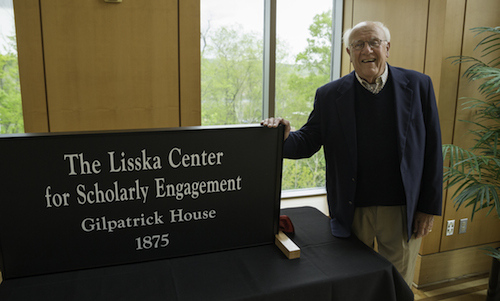Denison University has named its Lisska Center for Scholarly Engagement in honor of Professor Anthony J. Lisska in recognition of his enduring and exemplary service and dedication to the college. The Lisska Center’s mission is to promote intellectual dialogue and scholarly excellence on campus by supporting students, faculty and alumni applying for nationally competitive grants and fellowships; overseeing the Summer Scholar programs; serving as a contact point and funding hub for multidisciplinary intellectual programming and academic enrichment activities; and communicating and coordinating with other campus offices to help students explore summer, off-campus and post-graduate scholarship opportunities.
“At its core, colleges are about the life of the mind. We help students develop the capacity and passion for thinking about issues in deep ways. For this to happen effectively, students need to be on a campus where intellectual life is cultivated. Mentorship is core to the process. Nobody represents this ethos more than Tony, who has been a dedicated, challenging and supportive mentor to Denison students and his faculty colleagues for close to 50 years,” Denison University President Adam Weinberg said.
Lisska, a professor of philosophy and holder of the Maria Theresa Barney Professorship, joined the Denison faculty in 1969. He has served as Dean of the College for a five-year period, chaired the Department of Philosophy twice, and he served as the founding director of the Honors Program at Denison for 15 years. Lisska is the author of two books: “Aquinas Theory of Natural Law: An Analytic Reconstruction,” and “Philosophy Matters,” with a third book ready to go to press, and he is the author of nearly 60 philosophical articles, essays in books and book reviews. He received the Carnegie Foundation United States Baccalaureate Colleges Professor of the Year Award and the Sears National Teaching Award at Denison. Lisska holds a Bachelor of Arts from Providence College, a master’s from St. Stephen's College, and a doctorate from Ohio State University.
“Tony Lisska is an inspiration to so many of us on this campus — a model for us all of intellectual seriousness and accomplishment while being a terrific and award-winning teacher whose commitment to his students, and to Denison, is second to none,” said Steve Vogel, professor, chair of the philosophy department and chair of the faculty. “The remarkable transformation that Denison has undergone over the last quarter century is due in no large measure to Tony and the work he did as founder of the Honors Program, the precursor to today’s Lisska Center. All Denisonians owe Tony an enormous debt of gratitude.”
The Lisska Center runs a variety of programs that support intellectual and scholarly life across campus. It supports fellowship applications, oversees on- and off-campus summer research programs and promotes student research. The center serves as a hub for events that bring students, faculty, staff and others together around intellectual and scholarly exchanges. Examples include Research Tables, which bring together faculty members from Denison and/or other institutions to explore an interdisciplinary topic; informal gatherings with visiting speakers; and roundtable conversations and lunches around topics of interest.
Lisska was an evaluator for curriculum projects on four occasions for The National Endowment for the Humanities and has served on multiple occasions as an external consultant for Honors Program development and philosophy department evaluation. He is a founding member of the National Association of Fellowship Advisors. Recent Honors Program narratives have been presented to the American Council of Academic Deans and at the National Meetings of the National Collegiate Honors Council. Lisska was the central author for Denison’s North Central accreditation project in 1980.
Lisska’s service to the community has been exemplary as well; in 2004 and again in 2008, he served as president of The Granville Foundation, and he has served as a long-standing member of the Granville Historical Society, having given more than thirty presentations on topics in regional history.
